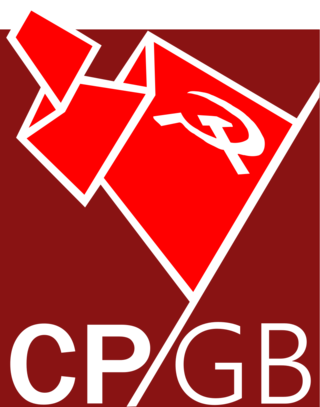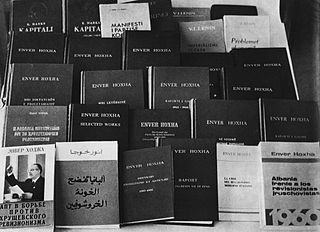Related Research Articles

The Communist Party of Great Britain is a political group which publishes the Weekly Worker newspaper. The CPGB (PCC) claims to have "an internationalist duty to uphold the principle, 'One state, one party'. To the extent that the European Union becomes a state then that necessitates EU-wide trade unions and a Communist Party of the EU". In addition, it is in favour of the unification of the entire working class under a new Communist International. It is not to be confused with the former Communist Party of Great Britain, the Communist Party of Great Britain (Marxist–Leninist), or the current Communist Party of Britain.

The Democratic Socialist Perspective (DSP) was an Australian Marxist political group, which operated as the largest component of a broad-left socialist formation, the Socialist Alliance. In 2010, the DSP voted to merge into the Socialist Alliance.

The Revolutionary Communist Group (RCG) is a communist, Marxist and Leninist political organisation in the United Kingdom.
The New Communist movement (NCM) was a diverse left-wing political movement during the 1970s and 1980s. The NCM were a movement of the New Left that represented a diverse grouping of Marxist–Leninists and Maoists inspired by Cuban, Chinese, and Vietnamese revolutions. This movement emphasized opposition to racism and sexism, solidarity with oppressed peoples of the third-world, and the establishment of socialism by popular revolution. The movement, according to historian and NCM activist Max Elbaum, had an estimated 10,000 cadre members at its peak influence.

The Communist Workers' Organisation (CWO) is a British left communist group, founded in 1975, and an affiliate of the Internationalist Communist Tendency, formerly the International Bureau for the Revolutionary Party. It publishes a quarterly magazine called Revolutionary Perspectives and distributes the agitational broadsheet Aurora. Works of the CWO and ICT have been cited in various academic and political sources internationally, across several countries and languages. The organisation has its origins in north England and Scotland, though it has since grown to encompass other areas with members and sympathisers across the world.
The League of Revolutionary Struggle (Marxist–Leninist) was a Marxist–Leninist[1] movement in the United States formed in 1978 by merging communist organizations. It was dissolved by the organization's leadership in 1990.
The British left can refer to multiple concepts. It is sometimes used a shorthand for groups aligned with the Labour Party. It can also refer to other individuals, groups and political parties that have sought egalitarian changes in the economic, political, and cultural institutions of the United Kingdom. Various subgroups with a national scope are active. Liberals and progressives believe that equality can be accommodated into existing capitalist structures, but they differ in their criticism of capitalism and on the extent of reform and the welfare state. Anarchists, communists, socialists, and social democrats, among others, with international imperatives are also present within this macro-movement.
The International Marxist Group (IMG) was a Trotskyist group in Britain between 1968 and 1982. It was the British Section of the Fourth International. It had around 1,000 members and supporters in the late 1970s. In 1980, it had 682 members; by 1982, when it changed its name to the Socialist League, membership had fallen to 534.
The Workers' Party of New Zealand was a minor political party in New Zealand.

A popular front is "any coalition of working-class and middle-class parties", including liberal and social democratic ones, "united for the defense of democratic forms" against "a presumed Fascist assault". More generally, it is "a coalition especially of leftist political parties against a common opponent".

Hoxhaism is a variant of anti-revisionist Marxism–Leninism that developed in the late 1970s due to a split in the anti-revisionist movement, appearing after the ideological dispute between the Chinese Communist Party and the Party of Labour of Albania in 1978. The ideology is named after Enver Hoxha, a notable Albanian communist leader, who served as the First Secretary of the Party of Labour.
The Socialist Alliance was a left-wing electoral alliance in England between 1999 and 2005.
Left Unity is a left-wing political party in the United Kingdom founded in 2013 when film director and social campaigner Ken Loach appealed for a new party to replace the Labour Party. More than 10,000 people supported Loach's appeal.
Workers' Power is a Trotskyist group which forms the British section of the League for the Fifth International. The group publishes the newspaper Workers Power and distributes the English-language journal Fifth International.
The Alliance for Workers' Liberty (AWL), also known as Workers' Liberty, is a Trotskyist group in Britain and Australia, which has been identified with the theorist Sean Matgamna throughout its history. It publishes the newspaper Solidarity.
References
- ↑ "Republican Communist Network - Weekly Worker". weeklyworker.co.uk. Retrieved 18 August 2016.
- ↑ "Emancipation & Liberation » Author: Steve Freeman". republicancommunist.org. Retrieved 18 August 2016.
- ↑ "Republican Socialism and Left Unity | Left Unity". leftunity.org. Retrieved 18 August 2016.
- ↑ "Emancipation & Liberation » REPUBLICAN SOCIALIST ALLIANCE". republicancommunist.org. 11 August 2013. Retrieved 18 August 2016.
- ↑ "Communist Platform statement on the candidacy of Steve Freeman | Left Unity". leftunity.org. Retrieved 18 August 2016.